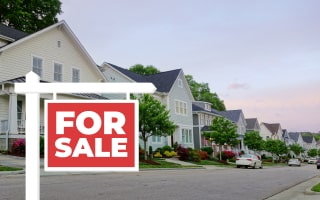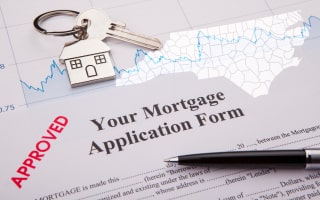Home Buying in North Carolina

The Tar Heel State of North Carolina offers a captivating blend of natural beauty, vibrant culture, and a strong economy. From charming Blue Ridge Mountain retreats and coastal homes along the Outer Banks, to thriving urban living environments in Charlotte, Raleigh, and Wilmington, this diverse state has something to offer everyone. However, it's not just its historic downtowns, world-class universities, stunning national parks, and pristine beaches drawing interest from homebuyers far and wide. A growing job market, affordable housing options, and family-friendly communities have contributed to a particularly unique housing market.
Compared to most other states, North Carolina has a relatively low cost of living. So, it is no surprise the state has maintained one of the fastest-growing populations for some time. North Carolina's median home price, roughly $380,000, is considerably lower than the national average. It's also lower than the median home price in neighboring Virginia and South Carolina. However, the median cost is significantly higher in more desirable counties like New Hanover and Pender Counties.
North Carolina is a seller's market, with homes selling at or near the asking price. The state's median Days on Market (DOM) number, which reflects the amount of time a house stays on the market before it sells, is just over 30 days, which is in line with national averages.
Home buying in North Carolina requires potential buyers to familiarize themselves with local trends and potential obstacles before diving into the process. Whether you're a first-time homebuyer or a returning homebuyer seeking to move within the state, understanding the state's unique housing market is crucial for making a well-informed decision. That means working with a knowledgeable real estate professional and researching the latest housing trends and developments across the state.
Current North Carolina Housing Trends
When buying a home in North Carolina, several key housing trends must be considered, including:
-
Median Home Price
The median home price in North Carolina is roughly $350,000, below the national average, and lower than neighboring Virginia, where the median price exceeds $450,000. However, median home prices across the state vary. In rapidly growing cities like Raleigh and Charlotte, popular with homebuyers, median home prices are often above $400,000. In contrast, more affordable options can be found in rural parts of the state, where home prices can dip below $250,000. Desirable coastal areas like Wilmington also see higher home prices.
-
Number of Homes Sold
More than 13,000 homes are sold in North Carolina each month, a relatively high volume compared to many other states. The state's strong economy and continued population growth are likely contributors. Demand is particularly strong in metropolitan areas like Raleigh, Charlotte, and Durham. Homebuyers are drawn to these areas by the high standards of living, robust job markets, and vibrant communities.
Although some of the state's smaller, less popular towns continue to experience a lower sales volume, they are gaining interest from homebuyers in search of affordable housing. These properties also typically feature larger properties and access to the state's scenic landscapes.
-
Median Days on Market
A home in North Carolina usually stays on the market for 30 days before it sells. In popular cities like Raleigh and throughout Wake County, where Raleigh is located, homes can sell in half the time.
-
Housing Supply Statistics
As North Carolina's population grows, particularly in urban and suburban areas, significant pressure has been placed on the state's housing supply. Although inventory continues to rise, with more and more new construction permits being issued across the state, the pace of development still struggles to meet increasing demands. As a result, cities like Raleigh and Charlotte are experiencing heightened competition among buyers, driving up prices and offering fewer affordable options in the state's most desirable regions.
How to Find the Right Home

When searching for a home in North Carolina, buyers must consider several factors, including their preferred lifestyle, the location of the home, and the type of house they want to buy. A local North Carolina realtor can help you evaluate your specific needs.
Local agents have the knowledge and experience to help you navigate the North Carolina Real estate market. When searching for a licensed realtor, look for one with strong references or who has been referred to you by family and friends.
Finding the Right Home in North Carolina
Here are some important considerations when it comes to buying a home in North Carolina:
Location
When searching for a home in North Carolina, its location will profoundly affect your quality of life. The location of your home will determine how long it takes for you to get to and from work, your access to preferred amenities, what schools your child will attend, and how much you pay in property taxes.
-
Urban vs. rural lifestyles: Major cities like Raleigh and Charlotte provide vibrant urban living environments, many job opportunities, and a strong public transportation infrastructure. Durham, part of the world-renowned Research Triangle, is home to world-class universities and tech hubs. In small towns like Asheville, with its mountain views and outdoor recreational opportunities, and Wilmington, located on the coast, homebuyers will find more peaceful living environments with easy access to nature.
-
Proximity to Work: Commuting distance is often key for North Carolina homebuyers. As employment centers like Raleigh and Charlotte continue to grow rapidly, proximity to work affects residents' daily lives. Commutes are reasonable in more suburban locations like Cary and Huntersville, where more affordable housing can be found. Smaller towns and rural areas are typically more inexpensive and popular among remote workers or those not working in the state's major cities.
-
Public Transportation: North Carolina is home to 98 public transportation systems that serve more than 70 million passengers annually, including GoTriangle, serving Wake, Durham, and Orange counties; the Fayetteville Area System of Transit (FAST); the Asheville Transit System; the Greenville Area Transit (GREAT) bus system; and Pitt Area Transit, which serves Pitt County, including Greenville City limits. In addition, roughly 200 informal carpool/vanpool programs provide commuter services across the state.
-
Property Taxes: The average property tax rate in North Carolina is roughly .82%, better than the national average, though it varies across the state. For example, urban areas like Raleigh and Charlotte tend to have higher tax rates due to the demand for services and infrastructure. Even within cities, taxes can fluctuate based on neighborhoods and school districts. Property taxes are generally lower in rural areas and smaller towns.
Home Types
The diverse home type options across North Carolina reflect the state's varied landscapes and cultural influences.
Here are some examples:
-
Single-Family Homes: The most common housing type in North Carolina is the single-family home, particularly in the state's suburban and rural regions. Traditional single-family homes deliver privacy and space, especially in areas where land is more affordable. They are popular with families and those seeking a quieter, more spacious living environment.
-
Condos: Condominiums are popular in North Carolina's urban centers, like Charlotte and Raleigh. They provide a low-maintenance living option with access to great on-site amenities like gyms and swimming pools. Although condos in North Carolina are generally more affordable than traditional single-family homes, they often come with fees that should be factored into potential homebuyers' budgets.
-
Townhomes: Townhomes are considered a middle ground between single-family homes and condominiums. They offer a balance of affordability, space, and autonomy. Popular in the state's urban centers, they are especially popular among first-time homebuyers and young professionals. They often feature shared community amenities.
-
Craftsman-Style Homes: North Carolina is renowned for its charming Craftsman-style homes, particularly in and around Asheville and Durham. These single-family homes often feature intricate woodwork, large front porches, and a cozy, traditional feel, making them highly desirable for homebuyers who prioritize charm and character.
The Homebuying Process North Carolina
North Carolina's home-buying process is as follows:
- Obtain a pre-qualification letter from a mortgage lender.
- Work with a local real estate agent.
- Make an offer on a home.
- Have the home inspected.
- Close on the home.
How to Finance Your North Carolina Home Purchase

North Carolina homebuyers have various financing options designed to suit different situations. It is important to choose a financing option that aligns with your financial needs and long-term goals when buying a home in North Carolina.
![]() Traditional Mortgages
Traditional Mortgages
Two types of traditional mortgage options are generally available to North Carolina homebuyers.
- Fixed-Rate Mortgages: Fixed-rate mortgages are a top choice among North Carolina homebuyers who expect to stay in their homes for many years and rely on the predictability of a fixed monthly payment. They offer a stable interest rate that remains the same throughout the life of the loan, making them the most common traditional home loan in North Carolina.
- Adjustable-Rate Mortgages (ARMs): Although an ARM can offer short-term savings, it comes with more risk, as rates can rise over time. That's because adjustable-rate mortgages have a rate that adjusts periodically based on market conditions. It is a good option for those planning to sell or refinance in the short term and in instances where interest rates are expected to drop.
Many North Carolina homebuyers rely on major lenders like Truist, Wells Fargo, and Bank of America for their home loan options. Local lender First Citizens Bank is also a favorite among North Carolina borrowers for its customer-focused service, flexible financing solutions, and specialized programs, especially for first-time buyers.
![]() Government-Backed Loans
Government-Backed Loans
Several government-backed loans, which often have more lenient credit requirements and lower down payment options than traditional mortgages, are available to qualified homebuyers in North Carolina, including:
- FHA Loans: Federal Housing Administration (FHA) loans offer lower down payments, helping to break the barrier to affordable housing by making them accessible to buyers with lower credit scores.
- VA Loans: Through the US Department of Veterans Affairs, qualified veterans and active-duty military members considering purchasing a home in North Carolina can access loans with favorable terms, such as no down payment and lower interest rates.
- USDA Loans: Designed for rural homebuyers, USDA loans are backed by the US Department of Agriculture, offer low interest rates, and may include no-down payment options. In North Carolina, USDA loans are a good option for home buyers who purchase property in rural or qualifying suburban areas.
- The NC Home Advantage Mortgage: The North Carolina Housing Finance Agency offers stable, fixed-rate mortgages for first-time and move-up home buyers.
![]() Down Payment Assistance Programs
Down Payment Assistance Programs
There are several down payment assistance programs available to North Carolina homebuyers.
In addition to the NC Home Advantage Mortgage program, which offers several down payment assistance options, homebuyers in Raleigh may qualify for zero-interest homebuyer assistance loans to help with down payments, closing costs, or gaps in financing. The House Charlotte First Time Home Buyer Program is available to qualified homebuyers in Charlotte.
North Carolina Home Insurance

Homeowners insurance in North Carolina is generally a bit more expensive than the national average, at around $2,500 annually. Since lenders typically mandate home insurance coverage as a condition for financing, prospective homebuyers should factor home insurance into their budget.
North Carolina is often under threat of hurricanes and tropical storms. Unfortunately, many basic policies do not cover damage from these storms. As a result, North Carolina homebuyers in certain areas may need to pay a hurricane deductible, which can raise the insurance price by 1–5% of your home's insured value.
Home Buying Challenges in North Carolina
While the North Carolina real estate market is generally attractive to homebuyers, there are some challenges that homebuyers may face, including:
-
Rising Home Prices: While North Carolina homes are generally more affordable than other states, the median home price continues to increase, and those looking for affordable options, particularly in growing metropolitan areas like Raleigh, Charlotte, and Durham, may face increased competition. While buyers seeking lower prices would be wise to explore suburban or rural areas of the state, where home values are more manageable, these regions are also experiencing price hikes due to heightened demand.
-
Limited Inventory: Housing inventory in North Carolina is rising, but the state continues to struggle to meet increasing demands, particularly in competitive markets like Raleigh and Charlotte, where buyer competition puts homeownership out of reach for some buyers.
North Carolina Home Inspections
North Carolina has a pleasant climate, making it a great place to buy property. Before purchasing, every buyer must have a home inspection to reveal any hidden issues with the house, so they don't have to make costly repairs after closing. A North Carolina home inspection protects the buyer and gives them options, including terminating the contract if they are uncomfortable with the inspection findings.
North Carolina home inspections examine the house's structural integrity, mechanical systems, and other included items. Some of the things the inspection covers include:
Structural Components
-
Foundation: The inspector looks for signs of settling, cracks, or water damage.
-
Walls, Floors, Ceilings: Checks for sagging, bowing, and cracks.
-
Roof: The inspector examines shingles, flashing, vents, chimneys, and gutters, looking for leaks, damage, and improper installation.
-
Exterior: Checks the home's siding, windows, doors, trim, and shutters, looking for signs of wear and tear, damage, or improper installation.
Mechanical Systems
-
Plumbing: Checks pipes and fixtures (sinks, tubs, showers, faucets, toilets) and looks for leaks or damage.
-
Electrical: Examines the electrical wiring, circuit breakers, outlets, and light fixtures, checking for any safety issues and working conditions.
-
HVAC (Heating, Venting, and Air Conditioning): Checks the functionality of heating and cooling systems along with ductwork.
-
Appliances: Test built-in and free-standing appliances (washer/dryer, fridge, dishwasher, oven, stove, etc.) to ensure they work.
Safety & Other Items
-
Safety: Checks stairs and handrails for safety issues. Ensures all smoke and carbon monoxide detectors and sprinkler systems are operational.
-
Grounds: Assesses drainage, driveways, sidewalks, porches, decks, etc.
-
Attic/Basement: Check insulation, venting, and any signs of water, pest, or other damage.
A typical home inspection in North Carolina costs between $350 and upwards of $1,000, depending on the home's size, age, and condition. The average cost of a Charlotte, NC home inspection is $375-$575.
The Process
The home inspection primarily benefits the buyer; therefore, they are the ones to pay for it. The process goes like this:
- Find a good, solid home inspection firm in North Carolina.
- Schedule the inspection as soon as allowed.
- Show up and stay for the inspection (they usually take 2-3 hours) and ask any questions you have.
- Review the finalized inspection report and decide what to do.
The top five home inspection companies in North Carolina are:
- Advantage Home Inspection - Raleigh, NC
- Advanced Quality Inspections - Clayton, NC
- Continental Home Inspections - Charlotte, NC
- America's Choice Inspections - Charlotte, NC
- VIP Home Inspection Services - Cary, NC
After the Inspection
After the inspection is complete, the inspector will create a comprehensive report detailing their findings. Once the buyer receives it, they can use it to negotiate a better deal, back out of the sale completely, ask for a lower down payment or warranty, or demand that the seller fix all the issues before closing.
Inspection Top Cities
| City | Inspection Cost | Local Issues | Local Rules | Local Home Types |
|---|---|---|---|---|
| Home Inspection in Charlotte | $300-$500 depending on the home's size, age, and any additional services needed like radon tests. | Roof, drainage, inadequate insulation, water damage, and foundation issues. | Inspections are not mandated. The North Carolina Home Inspector Licensure Board (NC HILB) regulates home inspectors. | Single-family homes, townhouses, Bungalows, Colonials, Ranch houses, and Craftsman. |
| Home Inspection in Raleigh | $400-$800 based on the size and complexity of the home. | Plumbing, HVAC, water damage, foundation and structural issues. | Follow guidelines from the North Carolina Home Inspector Licensure Board (OSFM) and provide the written report within three days of the inspection. | Traditional, Colonial, Craftsman, Ranch, Victorian, Tudor, and Mid-Century Modern. |
| Home Inspection in Greensboro | $400-$500 for a 2,500 square foot home. | Roof, HVAC, termites, plumbing, and foundation problems. | Requires a licensed inspector from the North Carolina Home Inspector Licensure Board (NC HILB). | Single-family homes, manufactured homes, condominiums, and apartments. |
| Home Inspection in Durham | $400-$1,000+ based on the size, age, and extra services needed. | Roofing, electrical wiring, plumbing, HVAC systems, and structural issues. | Follows state-level guidelines. | Single-family homes, apartments, and townhouses. |
| Home Inspection in Winston-Salem | $300-$500 based on the size and age of the home. | Roof, foundation, electricity, and poor ventilation. | Not legally mandated, no rules. | Traditional Ranch houses, condos, townhouses, and single-family homes. |
Navigating North Carolina Real Estate
Home buying in North Carolina allows prospective buyers to invest and settle in an area known for its natural beauty, strong economy, and thriving urban centers. North Carolina's housing market offers diverse options for homebuyers from the mountains to the coast and everywhere in between. However, anyone interested in purchasing a home in North Carolina must approach the market strategically because the state's rapidly growing population and increased demand for housing may prove challenging for some.
While affordable compared to many other states, home prices in North Carolina continue to rise, especially in urban areas. Therefore, to find the right fit, it is necessary to research local market trends, search in areas with more manageable home prices, and work closely with experienced real estate professionals.
With various housing options available, North Carolina caters to many preferences. By conducting thorough research, investigating the unique financing options available, and understanding the subtle nuances of homeowners insurance, homebuyers can confidently make well-informed decisions and navigate North Carolina's unique housing market.
Home Buying Guide
Instant Access to North Carolina Property Records
- Owner(s)
- Deed Records
- Loans & Liens
- Values
- Taxes
- Building Permits
- Purchase History
- Property Details
- And More!